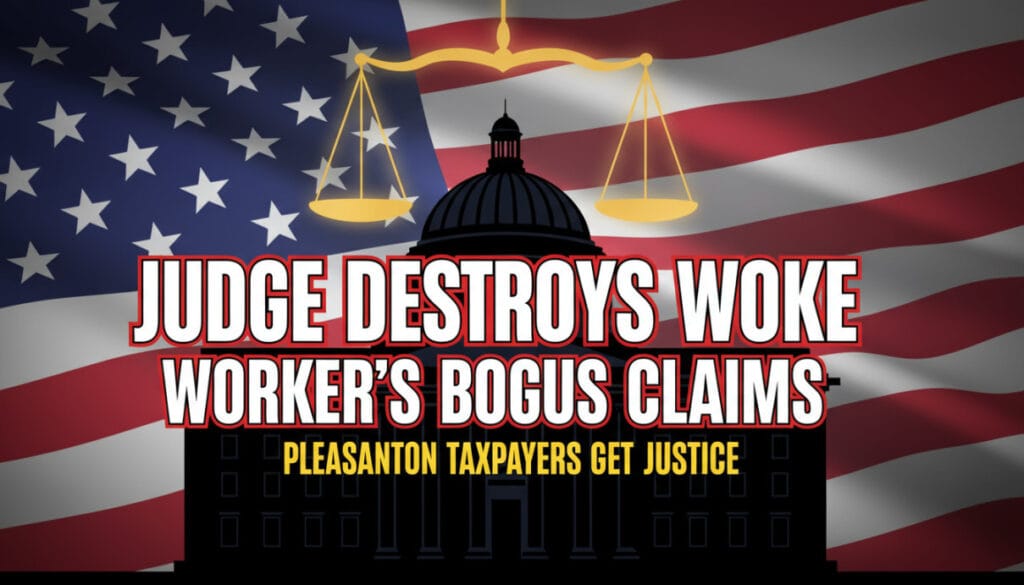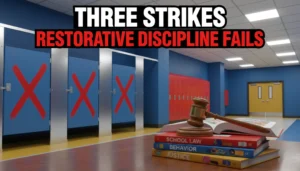Pleasanton Judge DESTROYS Woke Worker’s Bogus “Whistleblower” Claims – City Taxpayers Finally Get Justice!


Conservative Common Sense Prevails as Court Exposes the Truth Behind Yet Another Frivolous Lawsuit Against Hardworking Public Officials
In a stunning victory for accountability and fiscal responsibility, an Alameda County Superior Court judge has decisively thrown out what can only be described as a textbook example of everything wrong with today’s lawsuit-happy culture. On October 7, 2025, Judge Jenna Whitman delivered a crushing blow to former Pleasanton utilities manager Dan Repp’s desperate attempt to cash in on the current “whistleblower” craze that has become the go-to strategy for disgruntled employees across California.
The Real Story Behind the Headlines
While the mainstream media and liberal activists love to paint every fired government employee as a heroic whistleblower fighting “the system,” the facts in this case tell a dramatically different story. Dan Repp, who served as Pleasanton’s managing director of utilities and environmental services from June 2020 to July 2023, wasn’t some noble truth-teller exposing corruption. He was, according to extensive court documentation, a foul-mouthed, abusive manager who created a hostile work environment and then tried to weaponize California’s overly broad whistleblower protections when he finally faced consequences for his behavior.
The judge’s ruling was nothing short of devastating to Repp’s fabricated narrative. In her nine-page decision, Judge Whitman stated that many of Repp’s “purportedly ‘illegal reasons’ for termination are not tied to any evidence.” This isn’t legal jargon – this is a judge essentially calling out a plaintiff for making things up.
A Pattern of Misconduct, Not Heroism
The evidence presented in court painted a picture that should concern every taxpayer who expects professional behavior from highly-paid public servants. According to city documentation, Repp exhibited “a lack of tolerance for dissent, yelling and screaming at employees, making gestures of anger, swearing in an angry manner.”
But perhaps most telling was a specific incident where Repp allegedly told another city employee, “I don’t give a [expletive] about what you think is needed.” This wasn’t a passionate advocate for public safety – this was a public official who had clearly lost sight of basic professional standards and respect for his colleagues.
The city’s termination notice was crystal clear: Repp’s “use of profanity in the workplace toward a city employee was unprofessional and does not meet the expectations for your position as Managing Director of Utilities & Environmental Services.” In other words, he was fired for exactly the kind of behavior that would get someone terminated in any well-run organization.
The Whistleblower Smokescreen
When faced with legitimate consequences for his actions, Repp did what has become increasingly common in today’s victim-culture environment: he claimed retaliation. His lawsuit alleged that he was actually fired for exposing financial issues with the city’s water provider, Zone 7 Water Agency, which had failed to collect approximately $18 million in fees from customers.
This is where the case becomes particularly instructive for conservatives who have long argued that California’s whistleblower laws have been twisted beyond recognition. The original intent of these protections was to shield genuine public servants who risk their careers to expose actual wrongdoing. Instead, they’ve become a legal shield for problematic employees who want to avoid accountability.
Judge Whitman saw right through this strategy. She determined that other employees had actually raised the water agency issues before Repp did, undermining his claim to whistleblower status. More importantly, she found that the city had “compelling and legitimate reasons for the termination, particularly given Plaintiff’s responsibilities in a leadership role.”
The Age Discrimination Desperation Play
When the whistleblower angle failed to gain traction, Repp’s legal team threw in an age discrimination claim – another favorite tactic in the modern lawsuit playbook. This allegation was so weak that Judge Whitman dismissed it almost contemptuously, noting that Repp’s “evidence of age discrimination is speculative” and “insufficient.”
The judge’s language here is particularly significant. In legal terms, calling evidence “speculative” is judicial code for “you’re making this up.” For a case to survive summary judgment, plaintiffs need to present actual facts that could convince a reasonable jury. Repp couldn’t even meet that minimal standard.
A Victory for Fiscal Responsibility
This case represents far more than just one disgruntled employee’s failed lawsuit. It’s a crucial victory in the ongoing battle to restore sanity to California’s legal system and protect taxpayers from frivolous litigation that drains public resources.
Consider the broader implications: Repp’s lawsuit, filed in November 2023, has consumed nearly two years of court time, city attorney fees, and administrative resources. The city was forced to engage the San Jose-based law firm Burke, Williams and Sorensen through their regional liability insurance pool – costs that ultimately fall on Pleasanton taxpayers.
Meanwhile, City Manager Gerry Beaudin, who made the decision to terminate Repp, was subjected to depositions and legal scrutiny for doing exactly what taxpayers expect: holding public employees accountable for their conduct. The fact that Beaudin has declined to comment on the victory shows the kind of professional restraint that stands in stark contrast to Repp’s behavior.
The Broader Cultural Battle
This case is emblematic of a larger cultural problem that conservatives have been highlighting for years. We’ve created a system where personal responsibility has been replaced by victimhood narratives, where every consequence becomes someone else’s fault, and where the legal system is weaponized against legitimate authority.
The evidence suggests that Repp’s workplace behavior had been deteriorating for some time. The judge noted that the city had “preexisting concerns about Plaintiff’s lack of professionalism and ineffectiveness as a manager.” Yet instead of accepting responsibility and perhaps seeking to improve his performance, Repp chose to file a lawsuit seeking what his original tort claim suggested could be $1.65 million in damages.
This is precisely the kind of legal extortion that drives up costs for taxpayers and makes public officials hesitant to take necessary disciplinary action. When every termination becomes a potential lawsuit, when every performance issue becomes a discrimination claim, the result is a public sector that becomes increasingly dysfunctional and unaccountable.
The Appeal: Doubling Down on Failure
Perhaps most tellingly, Repp’s attorney, Judith Wolff, has indicated they plan to appeal the decision. This means taxpayers will be subjected to another one to two years of legal proceedings, during which the city will continue to incur defense costs. It’s a perfect example of how our legal system allows plaintiffs to impose costs on defendants even when their claims lack merit.
The appeal also demonstrates the mindset that has become all too common: rather than accepting that they lost because their case lacked merit, Repp and his legal team are doubling down, hoping that a different court might be more sympathetic to their narrative.
Lessons for Conservative Governance
This case offers several important lessons for conservative leaders and taxpayers:
First, it demonstrates the importance of thorough documentation when dealing with problematic employees. The city’s victory was possible because they maintained detailed records of Repp’s conduct and followed proper procedures in their investigation and termination process.
Second, it shows the value of fighting frivolous lawsuits rather than settling to avoid costs. While litigation is expensive, the city’s willingness to defend its legitimate actions sends a clear message that baseless claims won’t be rewarded.
Third, it highlights the need for continued reform of California’s whistleblower and employment laws. While protecting genuine whistleblowers is important, the current system is too easily abused by employees seeking to avoid consequences for poor performance or misconduct.
Looking Forward
As this case moves to the appeal phase, it will continue to serve as an important test of whether California’s courts will stand up to frivolous litigation or continue to enable a culture of legal opportunism. Judge Whitman’s decisive ruling offers hope that at least some members of the judiciary are willing to apply the law fairly rather than bending to political pressure.
For Pleasanton taxpayers, this victory represents money saved and a public sector that can function more effectively when managers know they can hold employees accountable without fear of retaliation lawsuits. For conservatives across California, it’s a reminder that persistence and principled defense of legitimate authority can still prevail, even in an increasingly hostile legal environment.
The real heroes in this story aren’t the disgruntled employee and his legal team – they’re the public officials who stood up for professional standards and the judge who had the courage to call out a frivolous lawsuit for what it really was. In an era where accountability has become increasingly rare, this victory deserves to be celebrated and replicated across the state.











